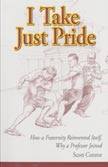Laurentian Reviews
Spring 2008
By Our Alumni
 Can a college fraternity choose an ambitious path – starting
with no hazing – and stick to it year after year? Can a fraternity
have fun and be manly without ending up in the headlines or
courts? And why would a faculty member say yes to a bid to join?
These and other questions fill the pages of I Take Just Pride:
How a Fraternity Reinvented Itself, Why a Professor Joined (Box
Grove Communications, distributed Atlas Books, 2007), by Scott
Conroe ’77.
Can a college fraternity choose an ambitious path – starting
with no hazing – and stick to it year after year? Can a fraternity
have fun and be manly without ending up in the headlines or
courts? And why would a faculty member say yes to a bid to join?
These and other questions fill the pages of I Take Just Pride:
How a Fraternity Reinvented Itself, Why a Professor Joined (Box
Grove Communications, distributed Atlas Books, 2007), by Scott
Conroe ’77.
Conroe’s narrative follows
Cornell University’s chapter
of Phi Kappa Tau from its folding in 1995 through 2006, after
the chapter was named most outstanding in the Phi Tau national. He
was teaching writing at Cornell in 2000, and researching fraternities,
when he first encountered the recolonized Phi Tau and became
its faculty advisor, with little idea of his role. His eventual initiation
into membership, the night before his 46th birthday, set him
on a path of self-discovery. Conroe’s humorous account
of his failure to receive a bid at St. Lawrence, and his perspectives
on the SLU Greek system in the 1970s and 1990s, serve as a
backdrop. Conroe will be on campus during Reunion Weekend, May 29-June
1, to sign copies of his book.--MD
Katie Homes '03 is the illustrator of a children's interactive yoga book. Sasha and Mishoo, Little Yoga Warriors (self-published using sustainable methods, www.littleyoga warriors.com, 2007) was created by Homes and Jeff Mix to connect children across the globe and show them how to strengthen their bodies and quiet their minds through the world of yoga. It is the first in a planned series of children's books that foster awareness and appreciation of the many diverse cultures around the world. --NSB
 Stuart Mesinger ’81 is the author of No
Place I'd Rather Be: Wit and Wisdom from Adirondack Lean-to
Journals (Adirondack Mountain Club, 2006). A
winner of the Adirondack Center for Writing’s nonfiction
award for Best Edited Collection of 2006, the volume provides
insight into the minds and motivations of those who venture
into the woods and offers glimpses of life on the trail,
with selections from the notebooks that occupy Adirondack
lean-tos for all comers to add to with inspiration, hilarity,
pathos and melancholy. --NSB
Stuart Mesinger ’81 is the author of No
Place I'd Rather Be: Wit and Wisdom from Adirondack Lean-to
Journals (Adirondack Mountain Club, 2006). A
winner of the Adirondack Center for Writing’s nonfiction
award for Best Edited Collection of 2006, the volume provides
insight into the minds and motivations of those who venture
into the woods and offers glimpses of life on the trail,
with selections from the notebooks that occupy Adirondack
lean-tos for all comers to add to with inspiration, hilarity,
pathos and melancholy. --NSB
Nathan Larkin ’78 has written Samson
and the Pirate Monks—Calling Men to an Authentic Brotherhood (Thomas
Nelson Inc., 2007). His creation, the Samson Society, is
a model of community and Friendship, according to a notice
in the Watertown Daily Times, which adds, “Mr.
Larkin’s story is one of addiction and loss and introduces
men whose honest admission of weakness has been the doorway
to healing.--NSB
By Our Faculty
The Sky Is Not A Ceiling (Orbis Books, 2007), by
Priest Associate Professor of Physics Aileen
O'Donoghue, is the story of her personal spiritual
journey, as she struggles to answer the question, "what's
out there?" What was it about the stars that drove O'Donoghue
back to morning Mass? And how did the universe enrich her faith?
Her discoveries are scientific and mystical, certain and mysterious.
This critically acclaimed book is a rich mix of science and
spirituality that goes beyond religion, and beyond the new
physics, to a universe without limits.--MD
In the 50 years since its creation, the focus of the North
American Aerospace Defense Command (NORAD) has shifted from
the threat of Soviet bombers to ballistic missiles to terrorist-highjacked
aircraft. In Canada in NORAD 1957-2007: A History (McGill-Queen's
University Press, 2007), Professor of Canadian
Studies Joseph T. Jockel ’74 looks
at Canada's role in the bi-national command.--MD
The Good Society: An Introduction to Comparative Politics (Longman
Press, 2007), by Professor of Government Alan L. Draper and
Emeritus Professor of Government J. Ansil Ramsay,
is a new textbook that the publisher claims is "a bold
departure" because the authors “outline the qualities
of a good society, then compare and evaluate postindustrial
democracies in the West, less-developed countries, and communist
and post-communist countries against this standard.--MD

